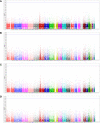Microvascular and macrovascular complications of type 2 diabetes mellitus: Exome wide association analyses
- PMID: 37033211
- PMCID: PMC10076756
- DOI: 10.3389/fendo.2023.1143067
Microvascular and macrovascular complications of type 2 diabetes mellitus: Exome wide association analyses
Abstract
Background: Type 2 diabetes mellitus (T2DM) is a chronic, metabolic disorder in which concomitant insulin resistance and β-cell impairment lead to hyperglycemia, influenced by genetic and environmental factors. T2DM is associated with long-term complications that have contributed to the burden of morbidity and mortality worldwide. The objective of this manuscript is to conduct an Exome-Wide Association Study (EWAS) on T2DM Emirati individuals to improve our understanding on diabetes-related complications to improve early diagnostic methods and treatment strategies.
Methods: This cross-sectional study recruited 310 Emirati participants that were stratified according to their medically diagnosed diabetes-related complications: diabetic retinopathy, diabetic neuropathy, diabetic nephropathy, and cardiovascular complications. The Illumina's Infinium Exome-24 array was used and 39,840 SNPs remained for analysis after quality control.
Findings: The analysis revealed the associations of various genes with each complication category: 1) diabetic retinopathy was associated to SHANK3 gene in locus 22q13.33 (SNP rs9616915; p=5.18 x10-4), ZSCAN5A gene in locus 19q13.43 (SNP rs7252603; p=7.55 x10-4), and DCP1B gene in locus 12p13.33 (SNPs rs715146, rs1044950, rs113147414, rs34730825; p=7.62 x10-4); 2) diabetic neuropathy was associated to ADH4 gene in locus 4q23 (SNP rs4148883; p=1.23 x10-4), SLC11A1 gene in locus 2q35 (SNP rs17235409; p=1.85 x10-4), and MATN4 gene in locus 20q13.12 (SNP rs2072788; p=2.68 x10-4); 3) diabetic nephropathy was associated to PPP1R3A gene in locus 7q31.1 (SNP rs1799999; p=1.91 x10-4), ZNF136 gene in locus 19p13.2 (SNP rs140861589; p=2.80 x10-4), and HSPA12B gene in locus 20p13 (SNP rs6076550; p=2.86 x10-4); and 4) cardiovascular complications was associated to PCNT gene in locus 21q22.3 (SNPs rs7279204, rs6518289, rs2839227, rs2839223; p=2.18 x10-4,3.04 x10-4,4.51 x10-4,5.22 x10-4 respectively), SEPT14 gene in locus 7p11.2 (SNP rs146350220; p=2.77 x10-4), and WDR73 gene in locus 15q25.2 (SNP rs72750868; p=4.47 x10-4).
Interpretation: We have identified susceptibility loci associated with each category of T2DM-related complications in the Emirati population. Given that only 16% of the markers from the Illumina's Infinium Exome chip passed quality control assessment, this demonstrates that multiple variants were, either, monomorphic in the Arab population or were not genotyped due to the use of a Euro-centric EWAS array that limits the possibility of including targeted ethnic-specific SNPs. Our results suggest the alarming possibility that lack of representation in reference panels could inhibit discovery of functionally important loci associated to T2DM complications. Further effort must be conducted to improve the representation of diverse populations in genotyping and sequencing studies.
Keywords: EWAS; T2DM; diabetes; macrovascular complications; microvascular complications; nephropathy; neuropathy; retinopathy.
Copyright © 2023 Mansour, Mousa, Abdelmannan, Tay, Hassoun and Alsafar.
Conflict of interest statement
The authors declare that the research was conducted in the absence of any commercial or financial relationships that could be construed as a potential conflict of interest.
Figures

References
Publication types
MeSH terms
Substances
LinkOut - more resources
Full Text Sources
Medical
Molecular Biology Databases

